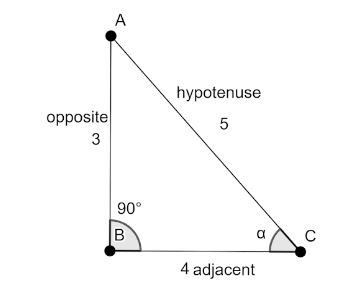Question
Question: If \(\sin \alpha = \dfrac{{ - 3}}{5}\), where \(\pi < \alpha < \dfrac{{3\pi }}{2}\) then, \(\dfrac{{...
If sinα=5−3, where π<α<23π then, 2cosα=
A. 10−1
B. 101
C. 103
D. 10−3
Solution
The given problem has only the sin function and we are supposed to find the cos function. A range is also given, so we can first find out in which quadrant the function lies. For the given value of angle, we can find cos value. Then we move on to finding out the final answer.
Formula used:
cos2A=2cos2A−1
Complete step by step answer:
The given expression is as follows,
sinα=5−3
We know that,
sinα=hypotenuseopposite
We will consider the following right-angle triangle

The range for the angle αis given as
π<α<23π
From the above, we can figure out that α lies in the Quadrant III. In Quadrant III both sin and the cosfunctions are negative.
We now, will find out the range of 2cosα
The range is π<α<23π
To find out the range of 2α divide the given range by two completely.
2π<2α<43π
This is the range of Quadrant II. The cos function is negative in the Quadrant II as well.
If, sinα=5−3
Then, using Pythagoras theorem, we have
cosα=5−4
Using the above-mentioned formulas,
cosα=2cos2(2α)−1
We know the value of cosα
By substituting, we get
⇒5−4=2cos2(2α)
Rearranging the equation to get cos(2α) on the LHS,
⇒2cos2(2α)=1−54⇒cos2(2α)=101
Removing the square on both the sides, we get
cos(2α)=101
Since 2α lies in Quadrant II, the cos function will be negative.
Therefore, the final answer is cos(2α)=10−1
Hence, option A is the correct answer.
Note: Noting down the quadrant and whether the function will be positive or negative is an important aspect. If the wrong sign is put, the final answer will be wrong. In the last step do not keep the root for the whole number because negative roots cannot be defined.
